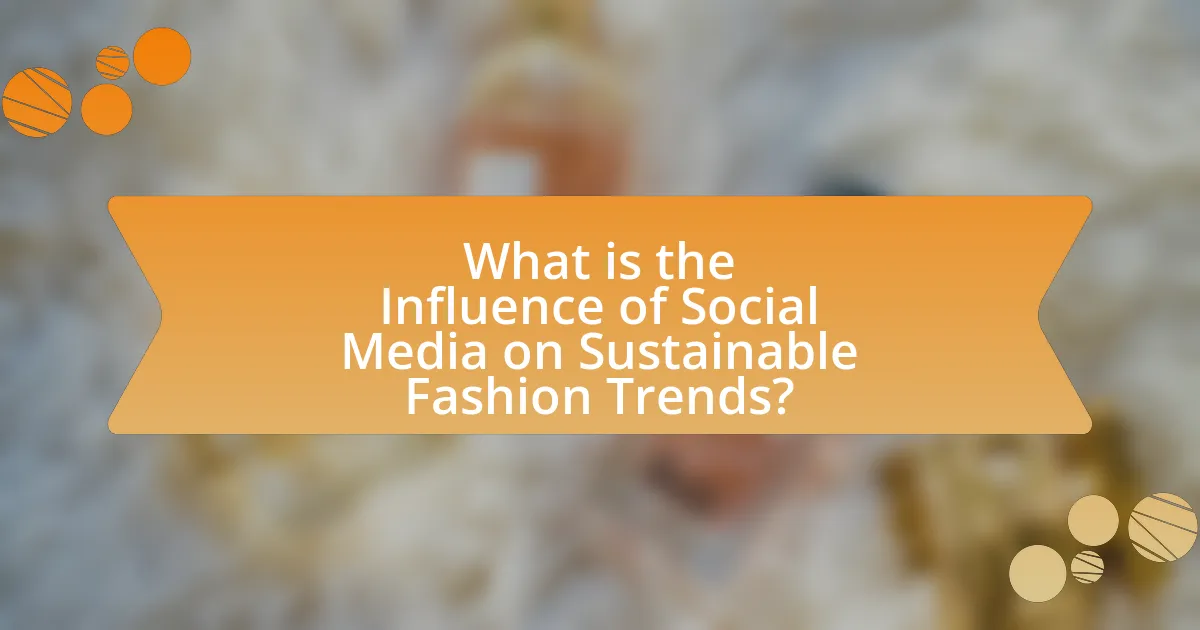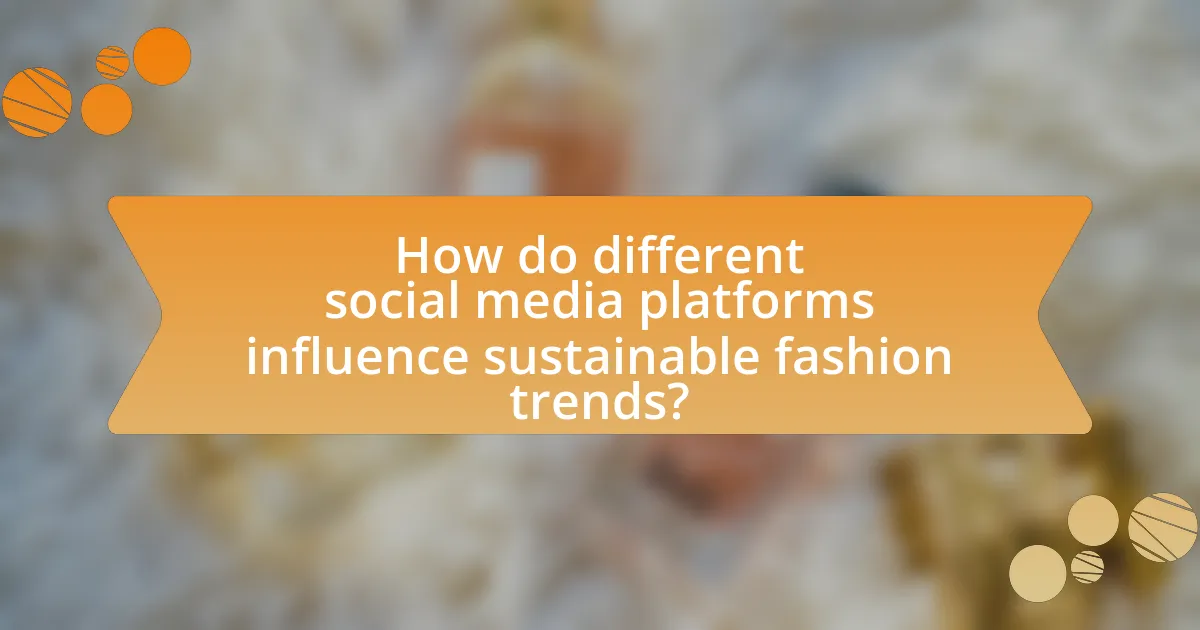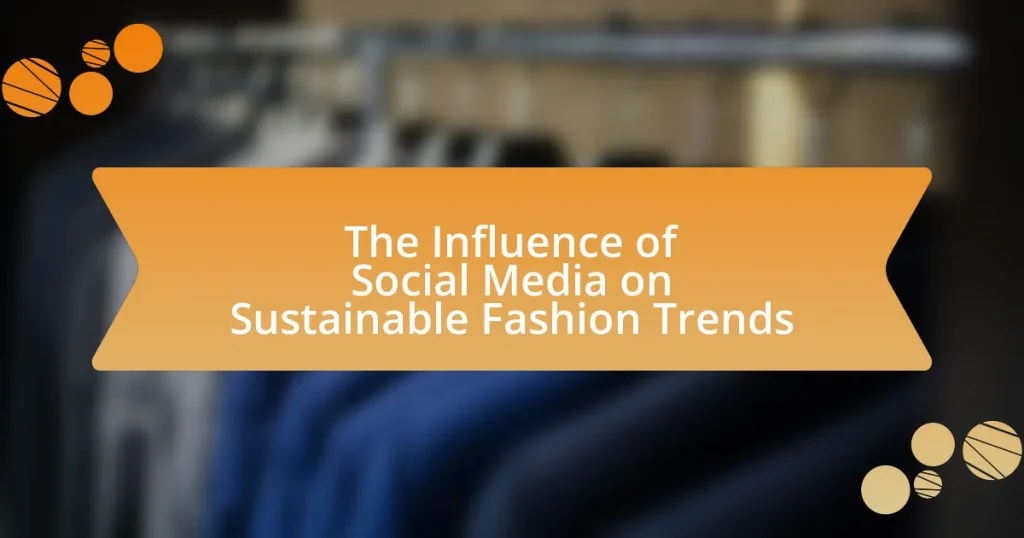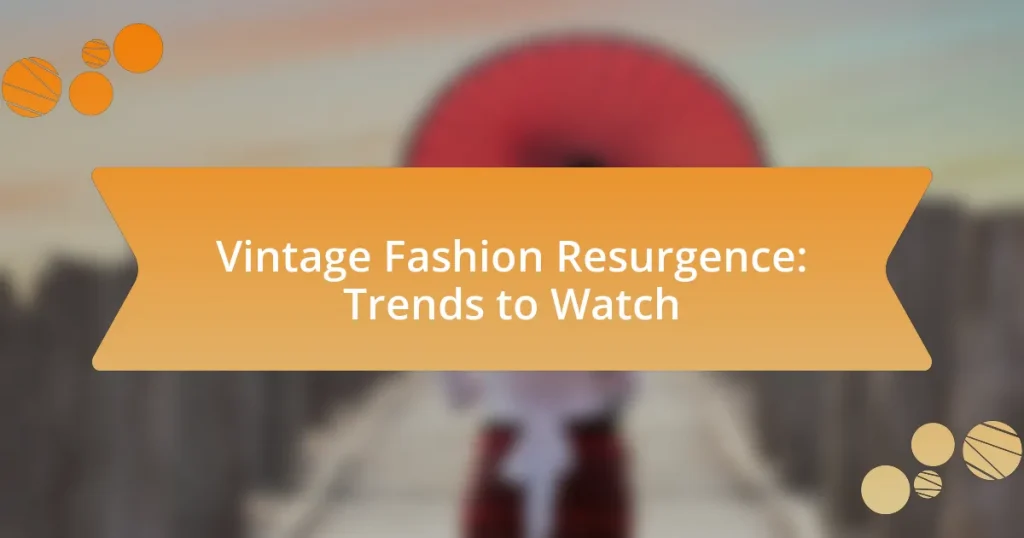The article examines the significant influence of social media on sustainable fashion trends, highlighting how platforms like Instagram and TikTok amplify awareness and promote eco-friendly practices among consumers. It discusses the role of influencers in shaping consumer perceptions and driving engagement, as well as the challenges sustainable fashion brands face in communicating their values effectively. Additionally, the article explores how different social media platforms facilitate discussions about sustainability, the impact of community-driven initiatives, and the future trends of social media’s role in promoting sustainable fashion. Key findings indicate that social media not only enhances brand visibility but also fosters consumer loyalty and encourages responsible purchasing decisions.

What is the Influence of Social Media on Sustainable Fashion Trends?
Social media significantly influences sustainable fashion trends by amplifying awareness and promoting eco-friendly practices among consumers. Platforms like Instagram and TikTok enable brands and influencers to showcase sustainable products, thereby reaching a broader audience and encouraging environmentally conscious purchasing decisions. For instance, a study by the Journal of Fashion Marketing and Management found that 79% of consumers are influenced by social media when making fashion purchases, highlighting its role in shaping consumer behavior towards sustainability. Additionally, social media campaigns often emphasize transparency and ethical practices, further driving the demand for sustainable fashion.
How does social media shape consumer perceptions of sustainable fashion?
Social media significantly shapes consumer perceptions of sustainable fashion by amplifying awareness and engagement with eco-friendly practices. Platforms like Instagram and TikTok showcase sustainable brands and influencers, creating a visual narrative that highlights the importance of ethical consumption. Research indicates that 62% of consumers are influenced by social media when making purchasing decisions, particularly regarding sustainability. This influence is further reinforced by user-generated content, where consumers share their sustainable fashion choices, fostering a community that values and promotes eco-consciousness.
What role do influencers play in promoting sustainable fashion on social media?
Influencers play a crucial role in promoting sustainable fashion on social media by leveraging their platforms to raise awareness and drive consumer behavior towards eco-friendly brands. They utilize their reach and credibility to educate followers about sustainable practices, such as ethical sourcing and environmentally friendly materials. For instance, a study by the University of Southern California found that 70% of consumers are influenced by social media when making purchasing decisions, highlighting the significant impact influencers have in shaping attitudes towards sustainable fashion. By showcasing sustainable brands and sharing personal stories about their eco-conscious choices, influencers effectively encourage their audience to consider sustainability in their fashion purchases.
How do social media platforms facilitate discussions about sustainability in fashion?
Social media platforms facilitate discussions about sustainability in fashion by providing a space for brands, influencers, and consumers to share information, experiences, and opinions. These platforms enable real-time communication and engagement, allowing users to participate in conversations about sustainable practices, ethical sourcing, and eco-friendly materials. For instance, hashtags like #SustainableFashion and #EcoFriendlyFashion help aggregate content, making it easier for users to find and contribute to discussions. Additionally, studies show that social media campaigns can significantly raise awareness; for example, a 2021 report by McKinsey & Company highlighted that 67% of consumers are influenced by social media when making sustainable fashion choices. This demonstrates the powerful role social media plays in shaping public discourse and driving change in the fashion industry.
Why is social media a powerful tool for sustainable fashion brands?
Social media is a powerful tool for sustainable fashion brands because it enables direct engagement with consumers, fostering community and awareness around sustainability issues. This platform allows brands to share their values, showcase eco-friendly practices, and connect with like-minded individuals, which is crucial in a market where consumers increasingly prioritize ethical consumption. According to a 2021 study by McKinsey & Company, 67% of consumers consider sustainability when making purchasing decisions, highlighting the importance of effective communication through social media. Additionally, social media facilitates viral marketing, allowing sustainable fashion messages to reach a broader audience quickly, thereby amplifying their impact and driving consumer behavior towards more sustainable choices.
What advantages do sustainable fashion brands gain from social media marketing?
Sustainable fashion brands gain increased visibility and engagement through social media marketing. This platform allows them to reach a broader audience, particularly environmentally conscious consumers, and build a community around their values. For instance, brands like Reformation have successfully utilized Instagram to showcase their sustainable practices, resulting in a significant increase in brand awareness and customer loyalty. Additionally, social media enables these brands to share educational content about sustainability, fostering a deeper connection with their audience and encouraging responsible consumer behavior. This strategic use of social media not only enhances brand reputation but also drives sales, as evidenced by a 2021 study showing that 54% of consumers are more likely to purchase from brands that actively promote sustainability on social media.
How does social media help in building brand loyalty for sustainable fashion?
Social media helps in building brand loyalty for sustainable fashion by facilitating direct engagement between brands and consumers, fostering community, and promoting transparency. Brands can share their sustainability practices and values through platforms like Instagram and Facebook, allowing consumers to connect emotionally with the brand’s mission. For instance, a study by the Journal of Business Research found that brands that actively engage with their audience on social media can increase customer loyalty by 23%. Additionally, user-generated content and influencer partnerships on social media amplify brand messages, creating a sense of belonging among consumers who prioritize sustainability. This engagement not only enhances brand visibility but also reinforces consumer trust, leading to increased loyalty.
What challenges do sustainable fashion brands face on social media?
Sustainable fashion brands face significant challenges on social media, primarily due to the need to effectively communicate their values and differentiate themselves in a crowded marketplace. These brands often struggle with limited reach and engagement compared to fast fashion competitors, which can overshadow their messaging. Additionally, the complexity of sustainability concepts can lead to misunderstandings among consumers, making it difficult for brands to convey their commitment to ethical practices clearly. Research indicates that 66% of consumers are confused about what sustainable fashion truly means, highlighting the communication gap that brands must navigate. Furthermore, the fast-paced nature of social media can pressure sustainable brands to compromise on their values for quick engagement, which can undermine their authenticity and credibility.
How do negative perceptions of sustainable fashion impact social media engagement?
Negative perceptions of sustainable fashion significantly reduce social media engagement by discouraging user interaction and participation. When consumers view sustainable fashion as expensive, ineffective, or elitist, they are less likely to share, comment, or promote related content on social media platforms. Research indicates that negative sentiment can lead to a 30% decrease in engagement metrics such as likes and shares, as users prefer to engage with brands and topics that align with their values and perceptions. Consequently, brands that fail to address these negative perceptions may struggle to build a loyal online community, ultimately impacting their visibility and influence in the sustainable fashion space.
What are the risks of greenwashing in social media marketing for sustainable fashion?
The risks of greenwashing in social media marketing for sustainable fashion include consumer mistrust, regulatory scrutiny, and reputational damage. When brands falsely claim to be environmentally friendly, they can mislead consumers, leading to skepticism about genuine sustainable practices across the industry. A study by the European Commission found that 42% of consumers encountered misleading green claims, which can result in increased regulatory actions against brands that engage in deceptive marketing. Additionally, brands that are exposed for greenwashing may suffer long-term reputational harm, as seen in cases like H&M’s “Conscious Collection,” which faced backlash for not being as sustainable as advertised. This combination of consumer backlash and regulatory consequences underscores the significant risks associated with greenwashing in the sustainable fashion sector.

How do different social media platforms influence sustainable fashion trends?
Different social media platforms significantly influence sustainable fashion trends by shaping consumer awareness and engagement. Instagram, for instance, serves as a visual platform where influencers showcase sustainable brands, leading to increased visibility and consumer interest; a study by the Journal of Fashion Marketing and Management found that 79% of users follow fashion influencers, impacting their purchasing decisions. TikTok, with its short-form video content, promotes viral trends that can rapidly elevate sustainable fashion brands, as seen with the #SustainableFashion hashtag gaining millions of views, encouraging users to adopt eco-friendly practices. Facebook facilitates community building around sustainable fashion, allowing users to share experiences and recommendations, which fosters a supportive environment for sustainable choices. Collectively, these platforms create a multifaceted approach to promoting sustainable fashion, driving both awareness and consumer behavior towards eco-conscious choices.
What unique features of Instagram promote sustainable fashion?
Instagram promotes sustainable fashion through features like visual storytelling, influencer partnerships, and community engagement. The platform’s emphasis on high-quality images allows brands to showcase eco-friendly products effectively, attracting consumers interested in sustainability. Influencers on Instagram often advocate for sustainable practices, reaching large audiences and raising awareness about ethical fashion choices. Additionally, features such as hashtags and dedicated sustainability-focused accounts facilitate community discussions and connections among users passionate about sustainable fashion, further amplifying the movement. These elements collectively enhance visibility and accessibility for sustainable fashion brands, driving consumer interest and engagement.
How do visual storytelling and aesthetics impact consumer interest in sustainable fashion on Instagram?
Visual storytelling and aesthetics significantly enhance consumer interest in sustainable fashion on Instagram by creating engaging and relatable content that resonates with users. High-quality visuals and compelling narratives draw attention, making sustainable fashion more appealing and accessible. Research indicates that posts featuring aesthetically pleasing images and storytelling elements can increase user engagement by up to 120%, as they evoke emotional responses and foster a sense of community around sustainable practices. This emotional connection encourages consumers to explore and invest in sustainable fashion brands, ultimately driving interest and sales.
What role do hashtags play in increasing visibility for sustainable fashion on Instagram?
Hashtags significantly enhance visibility for sustainable fashion on Instagram by categorizing content and making it discoverable to a broader audience. When users include relevant hashtags, such as #SustainableFashion or #EcoFriendly, their posts appear in searches and feeds associated with those tags, increasing the likelihood of engagement from users interested in sustainability. Research indicates that posts with at least one hashtag receive 12.6% more engagement than those without, demonstrating the effectiveness of hashtags in reaching potential followers and customers. This increased visibility can lead to greater awareness and support for sustainable fashion brands and initiatives.
How does TikTok contribute to the rise of sustainable fashion trends?
TikTok contributes to the rise of sustainable fashion trends by amplifying awareness and engagement through viral content and influencer partnerships. The platform’s algorithm promotes videos that resonate with users, allowing sustainable fashion creators to reach a broader audience quickly. For instance, hashtags like #SustainableFashion and #ThriftTok have garnered millions of views, showcasing eco-friendly brands and thrifted outfits, which encourages users to adopt sustainable practices. Additionally, TikTok influencers often share personal stories about their sustainable choices, making the concept relatable and inspiring their followers to embrace similar lifestyles. This combination of visibility and relatability effectively drives the movement towards sustainable fashion among younger demographics.
What types of content resonate most with TikTok users regarding sustainable fashion?
TikTok users resonate most with content that showcases sustainable fashion through engaging visuals, educational tips, and relatable storytelling. Specifically, videos that highlight upcycling, thrift flips, and DIY projects attract significant attention, as they demonstrate creativity while promoting eco-friendly practices. According to a study by the Fashion Institute of Technology, 70% of Gen Z consumers are influenced by social media when making sustainable fashion choices, indicating that TikTok’s dynamic format effectively engages this audience. Additionally, content that features influencers discussing their sustainable fashion journeys or brands that prioritize ethical practices garners high engagement, reinforcing the platform’s role in shaping sustainable fashion trends.
How do viral challenges on TikTok promote sustainable fashion practices?
Viral challenges on TikTok promote sustainable fashion practices by encouraging users to showcase eco-friendly clothing choices and upcycling techniques. These challenges often involve participants sharing their sustainable outfits or DIY projects, which raises awareness about the environmental impact of fast fashion. For instance, the #SustainableFashionChallenge has garnered millions of views, highlighting the importance of reusing and recycling garments. This visibility not only inspires others to adopt similar practices but also fosters a community that values sustainability, ultimately influencing consumer behavior towards more responsible fashion choices.
What is the impact of Facebook groups on sustainable fashion communities?
Facebook groups significantly enhance sustainable fashion communities by providing a platform for knowledge sharing, collaboration, and support among members. These groups facilitate discussions on sustainable practices, promote eco-friendly brands, and enable users to share resources such as second-hand clothing exchanges or DIY projects. Research indicates that social media platforms, including Facebook, foster community engagement and awareness, which are crucial for the growth of sustainable fashion movements. For instance, a study published in the Journal of Fashion Marketing and Management found that online communities can increase consumer commitment to sustainable practices by 30%, demonstrating the effectiveness of Facebook groups in mobilizing collective action towards sustainability in fashion.
How do discussions in Facebook groups influence consumer behavior towards sustainable fashion?
Discussions in Facebook groups significantly influence consumer behavior towards sustainable fashion by fostering community engagement and sharing information about eco-friendly practices. These discussions create a platform for users to exchange experiences, recommendations, and critiques of sustainable brands, which can enhance awareness and interest in sustainable fashion choices. Research indicates that social media interactions, particularly in niche groups, can lead to increased consumer trust and motivation to purchase sustainable products, as members often rely on peer validation and shared values. For instance, a study published in the Journal of Fashion Marketing and Management found that social media discussions can positively impact consumers’ attitudes towards sustainable fashion, ultimately driving purchasing decisions.
What role do community-driven initiatives play in promoting sustainable fashion on Facebook?
Community-driven initiatives play a crucial role in promoting sustainable fashion on Facebook by fostering engagement and awareness among users. These initiatives create platforms for individuals to share sustainable practices, such as upcycling and ethical consumption, which encourages collective action and knowledge sharing. For instance, Facebook groups dedicated to sustainable fashion often facilitate discussions, showcase eco-friendly brands, and organize events, thereby amplifying the reach of sustainable fashion messages. Research indicates that social media platforms, including Facebook, significantly influence consumer behavior, with 54% of users stating they are more likely to purchase from brands that demonstrate social responsibility. This demonstrates that community-driven initiatives not only raise awareness but also drive purchasing decisions towards sustainable options.
What are the future trends of social media’s influence on sustainable fashion?
Social media will increasingly drive the adoption of sustainable fashion through enhanced consumer awareness and engagement. Platforms like Instagram and TikTok are already showcasing eco-friendly brands and sustainable practices, influencing purchasing decisions among younger demographics. According to a 2021 survey by McKinsey, 67% of consumers consider sustainability when making fashion purchases, indicating a growing trend towards eco-conscious consumerism fueled by social media narratives. Additionally, influencers and content creators are expected to play a pivotal role in promoting sustainable brands, as their reach and authenticity resonate with audiences, further amplifying the message of sustainability in fashion.
How might emerging technologies change the landscape of sustainable fashion on social media?
Emerging technologies will significantly transform the landscape of sustainable fashion on social media by enhancing transparency, enabling personalized consumer experiences, and facilitating community engagement. Technologies such as blockchain can provide verifiable supply chain information, allowing consumers to trace the origins of their clothing and ensuring ethical practices. For instance, a study by the Fashion Institute of Technology found that 66% of consumers are willing to pay more for sustainable brands when they can verify their claims. Additionally, augmented reality (AR) can offer virtual try-ons, reducing the need for physical samples and returns, which contributes to sustainability. Social media platforms will increasingly leverage these technologies to create interactive and informative content, fostering a more informed consumer base that prioritizes sustainability.
What potential does augmented reality hold for sustainable fashion marketing on social media?
Augmented reality (AR) has significant potential for sustainable fashion marketing on social media by enhancing consumer engagement and promoting eco-friendly practices. AR allows brands to create immersive experiences that showcase sustainable products, enabling consumers to visualize how items fit into their lives while emphasizing the environmental benefits of those products. For instance, a study by Deloitte found that 88% of consumers prefer brands that demonstrate a commitment to sustainability, and AR can effectively communicate this commitment through interactive storytelling and virtual try-ons. By integrating AR into social media campaigns, sustainable fashion brands can increase awareness, drive sales, and foster a community of environmentally conscious consumers.
How can artificial intelligence enhance consumer engagement with sustainable fashion brands on social media?
Artificial intelligence can enhance consumer engagement with sustainable fashion brands on social media by personalizing content and improving customer interactions. AI algorithms analyze user behavior and preferences, allowing brands to tailor their messaging and product recommendations to individual consumers. For instance, a study by McKinsey & Company found that personalized marketing can increase engagement rates by up to 20%. Additionally, AI-powered chatbots provide real-time customer support, answering inquiries about sustainability practices and product details, which fosters a more interactive and informative experience. This combination of personalized content and responsive communication significantly boosts consumer interest and loyalty towards sustainable fashion brands.
What strategies can sustainable fashion brands adopt to leverage social media effectively?
Sustainable fashion brands can leverage social media effectively by creating engaging, authentic content that highlights their eco-friendly practices and values. This strategy involves showcasing behind-the-scenes processes, sharing customer testimonials, and using storytelling to connect emotionally with the audience. For instance, brands like Patagonia have successfully utilized Instagram to promote their commitment to sustainability, resulting in increased brand loyalty and customer engagement. Additionally, collaborating with influencers who align with sustainable values can amplify reach and credibility, as seen with brands partnering with eco-conscious influencers to promote their products. These approaches not only enhance visibility but also foster a community around sustainable fashion, driving consumer interest and sales.
How can brands create authentic content that resonates with their audience on social media?
Brands can create authentic content that resonates with their audience on social media by understanding their audience’s values and preferences, and aligning their messaging accordingly. Research indicates that 70% of consumers prefer brands that demonstrate authenticity, which can be achieved through storytelling that reflects real experiences and values. By showcasing user-generated content, engaging in transparent communication, and highlighting sustainable practices, brands can foster a genuine connection with their audience. For instance, brands like Patagonia effectively use social media to share their commitment to environmental sustainability, which resonates with their eco-conscious audience, leading to increased brand loyalty and engagement.
What best practices should sustainable fashion brands follow for social media engagement?
Sustainable fashion brands should prioritize authenticity and transparency in their social media engagement. Authenticity builds trust with consumers, as 86% of consumers say that transparency is important when choosing brands, according to a 2021 survey by Label Insight. Brands should share behind-the-scenes content that highlights their sustainable practices, such as ethical sourcing and production processes. Engaging storytelling about the brand’s mission and values can resonate with audiences, as 70% of consumers prefer brands that tell a story, according to a study by Headstream. Additionally, sustainable fashion brands should actively engage with their audience by responding to comments and messages, fostering a community around shared values. This approach not only enhances brand loyalty but also encourages user-generated content, which can amplify the brand’s reach and impact.
What practical tips can consumers follow to support sustainable fashion through social media?
Consumers can support sustainable fashion through social media by actively engaging with brands that prioritize eco-friendly practices. This includes following and sharing content from sustainable fashion brands, participating in online discussions about ethical fashion, and using hashtags like #SustainableFashion to raise awareness. Research indicates that social media can significantly influence consumer behavior, with 54% of users stating they have purchased a product after seeing it on social media (Sprout Social, 2021). By amplifying the message of sustainability, consumers can help shift industry standards towards more responsible practices.



